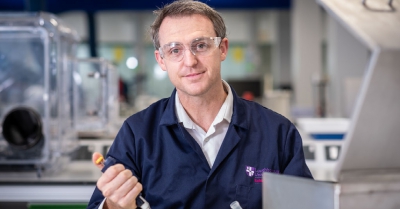Loughborough University researchers have developed a new platform technology that provides rapid screening of microorganisms in drinks – cutting the turnaround time from the current practice of up to five days to under one hour.
The team’s unique device – which deploys resistive pulse sensing – is being launched as a University spin-out, Figura Analytics, for use within the soft drinks industry to test for contaminants.
The industry has historically tested products through the manufacturing process for biological abnormalities – such as bacteria, yeast and fungi – and foreign bodies by taking samples and sending them to a lab to grow cultures, or via optical techniques. This takes time – an average of three to five days for a microbiological test – is costly and, in the case of optical techniques, lacks specificity.
Not only is the new technology significantly faster, but it can also identify things that cannot currently be tested for, such as conductivity, flavour bleed and microplastics.
The Loughborough team has been working closely with a number of leading brands in the drinks industry to validate and improve their processes. The technology has been fast-tracked through Innovate UK’s Innovation to Commercialisation of University Research (ICURe) programme.
Now, with the support of The Manufacturing Technology Centre and a further Innovate UK grant, the team has a technology ready for large scale manufacturing trials. The technology is low-cost, easy to assemble and multi-use in other sectors, including environmental and healthcare.
A parallel project with Italian specialist sensor component manufacturers Elements has shown that the process can provide both coronavirus pre-screening and a Covid-19 diagnosis – with promising results.
Rhush Maugi – an early-career researcher at Loughborough and one of the lead developers of the technology – said:
The technology has many applications, and the detection of SARS-CoV-2 is one immediate way we can help whilst demonstrating the power of the platform technology.
Technology Lead, Dr Mark Platt added:
We’re proud to have just secured Minerva PitchUP funding in addition to Innovate UK funding to take the technology forward within the drinks industry, but we are confident that this will be the start of a number of high potential applications where we can deliver real impact.
For the latest on our region, subscribe to Midlands Matters, the official newsletter of the Midlands Engine.




